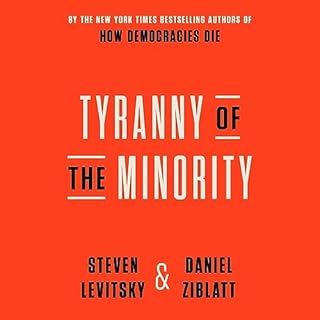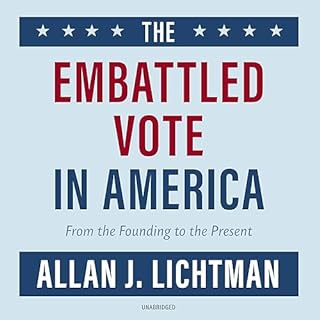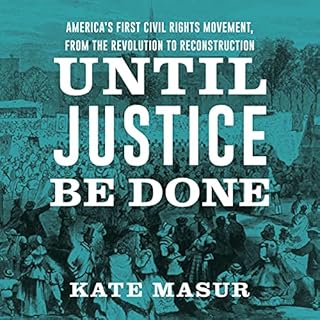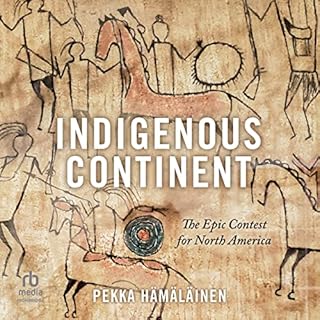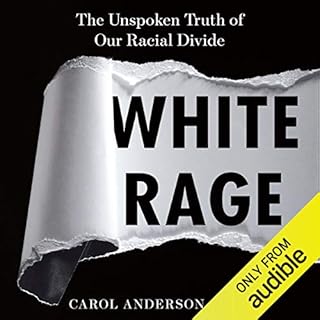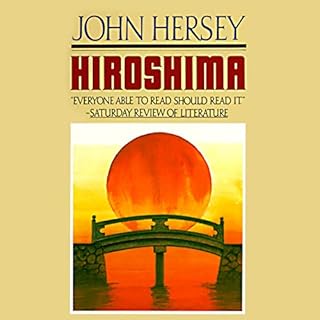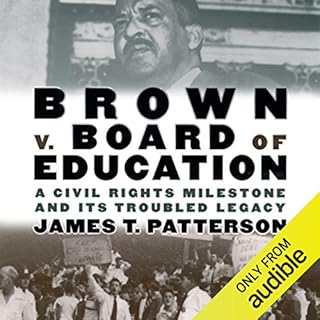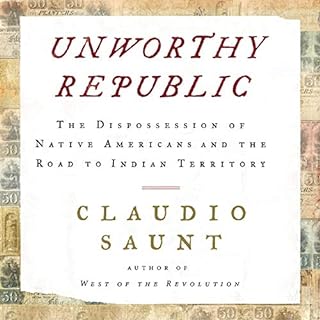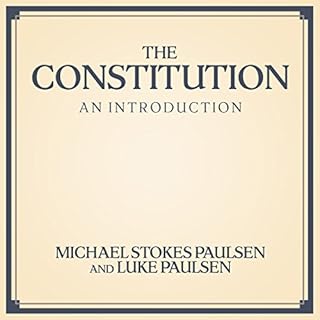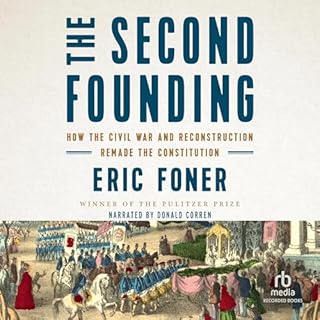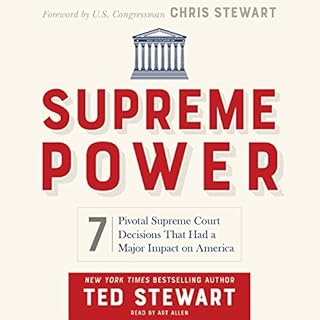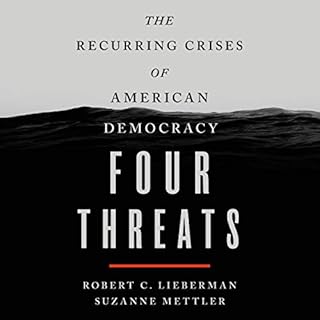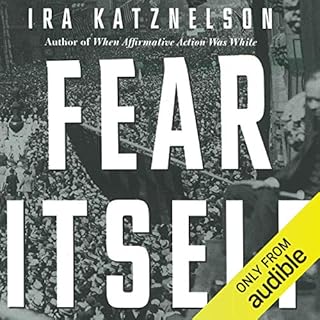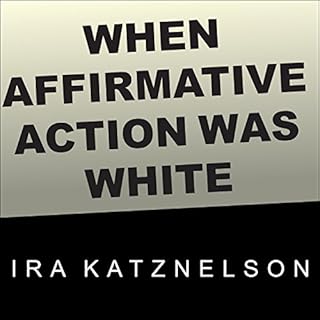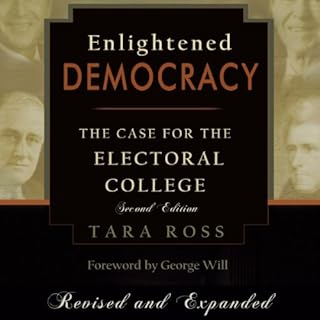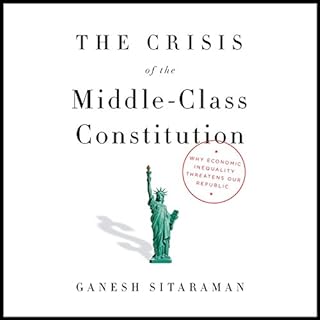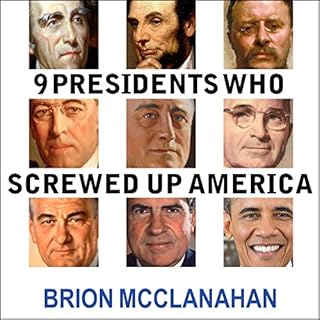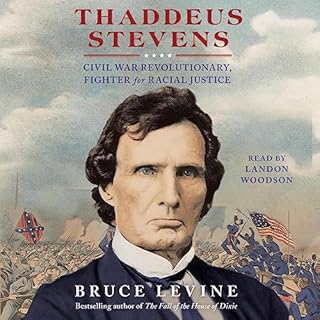
The Right to Vote
The Contested History of Democracy in the United States
Failed to add items
Add to Cart failed.
Add to Wish List failed.
Remove from wishlist failed.
Adding to library failed
Follow podcast failed
Unfollow podcast failed
 Prime members: New to Audible?
Prime members: New to Audible?Get 2 free audiobooks during trial.
Buy for $29.95
No default payment method selected.
We are sorry. We are not allowed to sell this product with the selected payment method
-
Narrated by:
-
Brian Troxell
About this listen
Originally published in 2000, The Right to Vote was widely hailed as a magisterial account of the evolution of suffrage from the American Revolution to the end of the 20th century. In this revised and updated edition, Keyssar carries the story forward, from the disputed presidential contest of 2000 through the 2008 campaign and the election of Barack Obama. The Right to Vote is a sweeping reinterpretation of American political history as well as a meditation on the meaning of democracy in contemporary American life.
Download the accompanying reference guide.©2000 Alexander Keyssar (P)2014 Audible, Inc.Listeners also enjoyed...
-
Tyranny of the Minority
- Why American Democracy Reached the Breaking Point
- By: Steven Levitsky, Daniel Ziblatt
- Narrated by: Fred Sanders
- Length: 8 hrs and 49 mins
- Unabridged
-
Overall4.5 out of 5 stars 299
-
Performance4.5 out of 5 stars 267
-
Story4.5 out of 5 stars 267
America is undergoing a massive experiment: It is moving, in fits and starts, toward a multiracial democracy, something few societies have ever done. But the prospect of change has sparked an authoritarian backlash that threatens the very foundations of our political system. Why is democracy under assault here, and not in other wealthy, diversifying nations? And what can we do to save it?
-
5 out of 5 stars
-
Tyranny of the Minority
- By orders on 10-07-23
By: Steven Levitsky, and others
-
How Democracies Die
- By: Steven Levitsky, Daniel Ziblatt
- Narrated by: Fred Sanders
- Length: 8 hrs and 24 mins
- Unabridged
-
Overall4.5 out of 5 stars 2,932
-
Performance4.5 out of 5 stars 2,543
-
Story4.5 out of 5 stars 2,527
Democracies can die with a coup d'état - or they can die slowly. This happens most deceptively when in piecemeal fashion, with the election of an authoritarian leader, the abuse of governmental power and the complete repression of opposition. All three steps are being taken around the world - not least with the election of Donald Trump - and we must all understand how we can stop them.
-
5 out of 5 stars
-
Connecting the Dots
- By Sharon F on 02-06-18
By: Steven Levitsky, and others
-
The Embattled Vote in America
- From the Founding to the Present
- By: Allan J. Lichtman
- Narrated by: Dennis Holland
- Length: 9 hrs and 49 mins
- Unabridged
-
Overall4.5 out of 5 stars 49
-
Performance4.5 out of 5 stars 44
-
Story4.5 out of 5 stars 44
America's political leaders have considered suffrage not a natural right but a privilege restricted by wealth, sex, race, residence, literacy, criminal conviction, and citizenship. Today, voter identification laws, political gerrymandering, registration requirements, felon disenfranchisement, and voter purges deny many millions of citizens the opportunity to express their views at the ballot box. We cannot blame the founders alone for America's embattled vote. Best-selling author Allan Lichtman notes that subsequent generations have failed to establish suffrage as a universal right.
-
1 out of 5 stars
-
Old Hat ...
- By Richard D. Parker on 01-17-19
-
Until Justice Be Done
- America's First Civil Rights Movement from the Revolution to Reconstruction
- By: Kate Masur
- Narrated by: Allyson Johnson
- Length: 14 hrs and 15 mins
- Unabridged
-
Overall4.5 out of 5 stars 16
-
Performance4.5 out of 5 stars 13
-
Story4.5 out of 5 stars 13
The half-century before the Civil War was beset with conflict over equality as well as freedom. Beginning in 1803, many free states, claiming the authority to maintain the domestic peace, enacted laws that discouraged free African Americans from settling their boundaries and restricted the rights to testify in court, move freely from place to place, work, vote, and attend public school. But over time, African American activists and their white allies, often facing mob violence, courageously built a movement to fight these racist laws.
-
4 out of 5 stars
-
Learned a lot of details yet still disappointed
- By Cameron U on 03-27-24
By: Kate Masur
-
Worse than Nothing
- The Dangerous Fallacy of Originalism
- By: Erwin Chemerinsky
- Narrated by: Daniel Henning
- Length: 7 hrs and 9 mins
- Unabridged
-
Overall4.5 out of 5 stars 70
-
Performance4.5 out of 5 stars 59
-
Story4.5 out of 5 stars 58
Originalism, the view that the meaning of a constitutional provision is fixed when it is adopted, was once the fringe theory of a few extremely conservative legal scholars but is now a well-accepted mode of constitutional interpretation. Noted legal scholar Erwin Chemerinsky gives a comprehensive analysis of the problems that make originalism unworkable as a method of constitutional interpretation. He argues that the framers themselves never intended constitutional interpretation to be inflexible and shows how it is often impossible to know the "original intent" of any provision.
-
5 out of 5 stars
-
Impeccably Logical, Backed by 100 Specific Example
- By Amy Eaton on 03-17-23
-
Indigenous Continent
- The Epic Contest for North America
- By: Pekka Hamalainen
- Narrated by: Kaipo Schwab
- Length: 18 hrs and 44 mins
- Unabridged
-
Overall4.5 out of 5 stars 124
-
Performance4.5 out of 5 stars 109
-
Story4.5 out of 5 stars 109
In Indigenous Continent, acclaimed historian Pekka Hämäläinen presents a sweeping counternarrative that shatters the most basic assumptions about American history. Shifting our perspective away from Jamestown, Plymouth Rock, the Revolution, and other well-trodden episodes on the conventional timeline, he depicts a sovereign world of Native nations whose members, far from helpless victims of colonial violence, dominated the continent for centuries after the first European arrivals.
-
4 out of 5 stars
-
indigenous Continent
- By katherine on 07-09-23
By: Pekka Hamalainen
-
Tyranny of the Minority
- Why American Democracy Reached the Breaking Point
- By: Steven Levitsky, Daniel Ziblatt
- Narrated by: Fred Sanders
- Length: 8 hrs and 49 mins
- Unabridged
-
Overall4.5 out of 5 stars 299
-
Performance4.5 out of 5 stars 267
-
Story4.5 out of 5 stars 267
America is undergoing a massive experiment: It is moving, in fits and starts, toward a multiracial democracy, something few societies have ever done. But the prospect of change has sparked an authoritarian backlash that threatens the very foundations of our political system. Why is democracy under assault here, and not in other wealthy, diversifying nations? And what can we do to save it?
-
5 out of 5 stars
-
Tyranny of the Minority
- By orders on 10-07-23
By: Steven Levitsky, and others
-
How Democracies Die
- By: Steven Levitsky, Daniel Ziblatt
- Narrated by: Fred Sanders
- Length: 8 hrs and 24 mins
- Unabridged
-
Overall4.5 out of 5 stars 2,932
-
Performance4.5 out of 5 stars 2,543
-
Story4.5 out of 5 stars 2,527
Democracies can die with a coup d'état - or they can die slowly. This happens most deceptively when in piecemeal fashion, with the election of an authoritarian leader, the abuse of governmental power and the complete repression of opposition. All three steps are being taken around the world - not least with the election of Donald Trump - and we must all understand how we can stop them.
-
5 out of 5 stars
-
Connecting the Dots
- By Sharon F on 02-06-18
By: Steven Levitsky, and others
-
The Embattled Vote in America
- From the Founding to the Present
- By: Allan J. Lichtman
- Narrated by: Dennis Holland
- Length: 9 hrs and 49 mins
- Unabridged
-
Overall4.5 out of 5 stars 49
-
Performance4.5 out of 5 stars 44
-
Story4.5 out of 5 stars 44
America's political leaders have considered suffrage not a natural right but a privilege restricted by wealth, sex, race, residence, literacy, criminal conviction, and citizenship. Today, voter identification laws, political gerrymandering, registration requirements, felon disenfranchisement, and voter purges deny many millions of citizens the opportunity to express their views at the ballot box. We cannot blame the founders alone for America's embattled vote. Best-selling author Allan Lichtman notes that subsequent generations have failed to establish suffrage as a universal right.
-
1 out of 5 stars
-
Old Hat ...
- By Richard D. Parker on 01-17-19
-
Until Justice Be Done
- America's First Civil Rights Movement from the Revolution to Reconstruction
- By: Kate Masur
- Narrated by: Allyson Johnson
- Length: 14 hrs and 15 mins
- Unabridged
-
Overall4.5 out of 5 stars 16
-
Performance4.5 out of 5 stars 13
-
Story4.5 out of 5 stars 13
The half-century before the Civil War was beset with conflict over equality as well as freedom. Beginning in 1803, many free states, claiming the authority to maintain the domestic peace, enacted laws that discouraged free African Americans from settling their boundaries and restricted the rights to testify in court, move freely from place to place, work, vote, and attend public school. But over time, African American activists and their white allies, often facing mob violence, courageously built a movement to fight these racist laws.
-
4 out of 5 stars
-
Learned a lot of details yet still disappointed
- By Cameron U on 03-27-24
By: Kate Masur
-
Worse than Nothing
- The Dangerous Fallacy of Originalism
- By: Erwin Chemerinsky
- Narrated by: Daniel Henning
- Length: 7 hrs and 9 mins
- Unabridged
-
Overall4.5 out of 5 stars 70
-
Performance4.5 out of 5 stars 59
-
Story4.5 out of 5 stars 58
Originalism, the view that the meaning of a constitutional provision is fixed when it is adopted, was once the fringe theory of a few extremely conservative legal scholars but is now a well-accepted mode of constitutional interpretation. Noted legal scholar Erwin Chemerinsky gives a comprehensive analysis of the problems that make originalism unworkable as a method of constitutional interpretation. He argues that the framers themselves never intended constitutional interpretation to be inflexible and shows how it is often impossible to know the "original intent" of any provision.
-
5 out of 5 stars
-
Impeccably Logical, Backed by 100 Specific Example
- By Amy Eaton on 03-17-23
-
Indigenous Continent
- The Epic Contest for North America
- By: Pekka Hamalainen
- Narrated by: Kaipo Schwab
- Length: 18 hrs and 44 mins
- Unabridged
-
Overall4.5 out of 5 stars 124
-
Performance4.5 out of 5 stars 109
-
Story4.5 out of 5 stars 109
In Indigenous Continent, acclaimed historian Pekka Hämäläinen presents a sweeping counternarrative that shatters the most basic assumptions about American history. Shifting our perspective away from Jamestown, Plymouth Rock, the Revolution, and other well-trodden episodes on the conventional timeline, he depicts a sovereign world of Native nations whose members, far from helpless victims of colonial violence, dominated the continent for centuries after the first European arrivals.
-
4 out of 5 stars
-
indigenous Continent
- By katherine on 07-09-23
By: Pekka Hamalainen
-
The Radicalism of the American Revolution
- By: Gordon S. Wood
- Narrated by: Paul Boehmer
- Length: 19 hrs and 2 mins
- Unabridged
-
Overall4 out of 5 stars 323
-
Performance4 out of 5 stars 259
-
Story4.5 out of 5 stars 259
Grand in scope, rigorous in its arguments, and elegantly synthesizing 30 years of scholarship, Gordon S. Wood's Pulitzer Prize–winning book analyzes the social, political, and economic consequences of 1776. In The Radicalism of the American Revolution, Wood depicts not just a break with England, but the rejection of an entire way of life: of a society with feudal dependencies, a politics of patronage, and a world view in which people were divided between the nobility and "the Herd."
-
4 out of 5 stars
-
Changed the Way I Think
- By Cynthia on 01-04-14
By: Gordon S. Wood
-
The Origins of Totalitarianism
- By: Hannah Arendt
- Narrated by: Nadia May
- Length: 23 hrs and 23 mins
- Unabridged
-
Overall4.5 out of 5 stars 935
-
Performance4.5 out of 5 stars 758
-
Story4.5 out of 5 stars 746
This classic, definitive account of totalitarianism traces the emergence of modern racism as an "ideological weapon for imperialism", beginning with the rise of anti-Semitism in Europe in the 19th century and continuing through the New Imperialism period from 1884 to World War I.
-
4 out of 5 stars
-
Vast and intricate analysis of horror
- By Roger on 08-04-08
By: Hannah Arendt
-
White Rage
- The Unspoken Truth of Our Racial Divide
- By: Carol Anderson
- Narrated by: Pamela Gibson
- Length: 6 hrs and 5 mins
- Unabridged
-
Overall4.5 out of 5 stars 3,019
-
Performance4.5 out of 5 stars 2,608
-
Story4.5 out of 5 stars 2,588
As Ferguson, Missouri, erupted in August 2014 and media commentators across the ideological spectrum referred to the angry response of African Americans as 'Black rage', historian Carol Anderson wrote a remarkable op-ed in the Washington Post showing that this was, instead, 'white rage at work. With so much attention on the flames,' she wrote, 'everyone had ignored the kindling.'
-
4 out of 5 stars
-
Good History, Was Hoping For More Insight
- By Mike on 09-08-16
By: Carol Anderson
-
Hiroshima
- By: John Hersey
- Narrated by: George Guidall
- Length: 5 hrs and 23 mins
- Unabridged
-
Overall4.5 out of 5 stars 371
-
Performance4.5 out of 5 stars 308
-
Story4.5 out of 5 stars 307
On August 6, 1945, Hiroshima was destroyed by the first atom bomb ever dropped on a city. This book, John Hersey's journalistic masterpiece, tells what happened on that day. Told through the memories of survivors, this timeless, powerful and compassionate document has become a classic "that stirs the conscience of humanity" (The New York Times).
-
5 out of 5 stars
-
Must read book
- By Kindle Customer on 08-06-20
By: John Hersey
-
The Power Worshippers
- Inside the Dangerous Rise of Religious Nationalism
- By: Katherine Stewart
- Narrated by: Tosca Hopkins
- Length: 11 hrs and 26 mins
- Unabridged
-
Overall4.5 out of 5 stars 526
-
Performance4.5 out of 5 stars 437
-
Story4.5 out of 5 stars 431
For too long the Religious Right has masqueraded as a social movement preoccupied with a number of cultural issues, such as abortion and same-sex marriage. In her deeply reported investigation, Katherine Stewart reveals a disturbing truth: this is a political movement that seeks to gain power and to impose its vision on all of society. America’s religious nationalists aren’t just fighting a culture war, they are waging a political war on the norms and institutions of American democracy.
-
2 out of 5 stars
-
The Audible editors were AWOL on this one
- By Frank Hightower on 05-24-20
-
Brown v. Board of Education: A Civil Rights Milestone and Its Troubled Legacy
- Oxford University Press: Pivotal Moments in US History
- By: James T. Patterson
- Narrated by: Steve Anderson
- Length: 9 hrs and 27 mins
- Unabridged
-
Overall4.5 out of 5 stars 46
-
Performance4.5 out of 5 stars 41
-
Story4.5 out of 5 stars 41
Most Americans still see Brown v. Board of Education as a triumph - but was it? James T. Patterson shrewdly explores the provocative questions that still swirl around the case. A wide range of characters animates the story, from the little-known African-Americans who dared to challenge Jim Crow with lawsuits; to Thurgood Marshall, who later became a Justice himself; to Earl Warren, who shepherded a fractured Court to a unanimous decision.
-
5 out of 5 stars
-
The Fight Against Inequality
- By Marcus on 03-05-15
-
The Rise of American Democracy
- Jefferson to Lincoln
- By: Sean Wilentz
- Narrated by: Joe Barrett
- Length: 39 hrs and 40 mins
- Unabridged
-
Overall5 out of 5 stars 29
-
Performance4.5 out of 5 stars 26
-
Story5 out of 5 stars 26
In this magisterial work, Sean Wilentz traces a historical arc from the earliest days of the republic to the opening shots of the Civil War. One of our finest writers of history, Wilentz brings to life the era after the American Revolution, when the idea of democracy remained contentious, and Jeffersonians and Federalists clashed over the role of ordinary citizens in government of, by, and for the people. The triumph of Andrew Jackson soon defined this role on the national level, while city democrats, Anti-Masons, fugitive slaves, and a host of others hewed their own local definitions.
-
4 out of 5 stars
-
If you need to sleep...
- By HueDCypher39 on 08-04-20
By: Sean Wilentz
-
Watergate
- By: Garrett M. Graff
- Narrated by: Jacques Roy, Garrett M. Graff
- Length: 25 hrs and 25 mins
- Unabridged
-
Overall5 out of 5 stars 482
-
Performance5 out of 5 stars 413
-
Story5 out of 5 stars 408
In the early hours of June 17, 1972, a security guard named Frank Wills enters six words into the log book of the Watergate office complex that will change the course of history: 1:47 AM Found tape on doors; call police. The subsequent arrests of five men seeking to bug and burgle the Democratic National Committee offices—three of them Cuban exiles, two of them former intelligence operatives—quickly unravels a web of scandal that ultimately ends a presidency and forever alters views of moral authority and leadership.
-
5 out of 5 stars
-
Elucidating
- By J.B. on 02-23-22
By: Garrett M. Graff
-
Unworthy Republic
- The Dispossession of Native Americans and the Road to Indian Territory
- By: Claudio Saunt
- Narrated by: Stephen Bowlby
- Length: 11 hrs and 36 mins
- Unabridged
-
Overall4.5 out of 5 stars 117
-
Performance5 out of 5 stars 96
-
Story5 out of 5 stars 95
In May 1830, the United States formally launched a policy to expel Native Americans from the East to territories west of the Mississippi River. Justified as a humanitarian enterprise, the undertaking was to be systematic and rational, overseen by Washington's small but growing bureaucracy. But as the policy unfolded over the next decade, thousands of Native Americans died under the federal government's auspices, and thousands of others lost their possessions and homelands in an orgy of fraud, intimidation, and violence.
-
5 out of 5 stars
-
A Slow Burn
- By Hervé DuThé on 04-20-20
By: Claudio Saunt
-
The Economic Weapon
- The Rise of Sanctions as a Tool of Modern War
- By: Nicholas Mulder
- Narrated by: Liam Gerrard
- Length: 12 hrs and 25 mins
- Unabridged
-
Overall4.5 out of 5 stars 109
-
Performance4.5 out of 5 stars 82
-
Story4.5 out of 5 stars 83
Economic sanctions dominate the landscape of world politics today. First developed in the early twentieth century as a way of exploiting the flows of globalization to defend liberal internationalism, their appeal is that they function as an alternative to war. This view, however, ignores the dark paradox at their core: designed to prevent war, economic sanctions are modeled on devastating techniques of warfare.
-
5 out of 5 stars
-
History of sanctions during the early 20th century
- By Mehdi Mollahasani on 03-05-22
By: Nicholas Mulder
-
The Liberty Amendments
- Restoring the American Republic
- By: Mark R. Levin
- Narrated by: Jason Culp, Mark R. Levin
- Length: 6 hrs and 54 mins
- Unabridged
-
Overall4.5 out of 5 stars 963
-
Performance4.5 out of 5 stars 845
-
Story4.5 out of 5 stars 852
Mark R. Levin has made the case, in numerous New York Times best-selling books - Men in Black, Liberty and Tyranny, and Ameritopia - that the principles undergirding our society and governmental system are unravelling. In The Liberty Amendments, he turns to the founding fathers and the constitution itself for guidance in restoring the American republic.
-
5 out of 5 stars
-
Only by contending with challenges...
- By TenStarDoug on 08-13-13
By: Mark R. Levin
-
Power and Liberty
- Constitutionalism in the American Revolution
- By: Gordon S. Wood
- Narrated by: David Colacci
- Length: 7 hrs and 5 mins
- Unabridged
-
Overall4.5 out of 5 stars 37
-
Performance4.5 out of 5 stars 33
-
Story4.5 out of 5 stars 33
The half century extending from the imperial crisis between Britain and its colonies in the 1760s to the early decades of the new republic of the United States was the greatest and most creative era of constitutionalism in American history, and perhaps in the world. During these decades, Americans explored and debated all aspects of politics and constitutionalism - the nature of power, liberty, representation, rights, the division of authority between different spheres of government, sovereignty, judicial authority, and written constitutions.
-
5 out of 5 stars
-
Provides Context for Todays Mess
- By Tad on 07-20-24
By: Gordon S. Wood
Related to this topic
-
The Embattled Vote in America
- From the Founding to the Present
- By: Allan J. Lichtman
- Narrated by: Dennis Holland
- Length: 9 hrs and 49 mins
- Unabridged
-
Overall4.5 out of 5 stars 49
-
Performance4.5 out of 5 stars 44
-
Story4.5 out of 5 stars 44
America's political leaders have considered suffrage not a natural right but a privilege restricted by wealth, sex, race, residence, literacy, criminal conviction, and citizenship. Today, voter identification laws, political gerrymandering, registration requirements, felon disenfranchisement, and voter purges deny many millions of citizens the opportunity to express their views at the ballot box. We cannot blame the founders alone for America's embattled vote. Best-selling author Allan Lichtman notes that subsequent generations have failed to establish suffrage as a universal right.
-
1 out of 5 stars
-
Old Hat ...
- By Richard D. Parker on 01-17-19
-
The Constitution
- An Introduction
- By: Michael Stokes Paulsen, Luke Paulsen
- Narrated by: Walter Dixon
- Length: 14 hrs and 31 mins
- Unabridged
-
Overall4.5 out of 5 stars 128
-
Performance4.5 out of 5 stars 113
-
Story4.5 out of 5 stars 115
From war powers to health care, freedom of speech to gun ownership, religious liberty to abortion, practically every aspect of American life is shaped by the Constitution. This vital document, along with its history of political and judicial interpretation, governs our individual lives and the life of our nation. Yet most of us know surprisingly little about the Constitution itself, and are woefully unprepared to think for ourselves about recent developments in its long and storied history.
-
5 out of 5 stars
-
The Constitution-A must reading for All Americans
- By Robert on 06-12-15
By: Michael Stokes Paulsen, and others
-
The Second Founding
- How the Civil War and Reconstruction Remade the Constitution
- By: Eric Foner
- Narrated by: Donald Corren
- Length: 7 hrs and 30 mins
- Unabridged
-
Overall4.5 out of 5 stars 360
-
Performance5 out of 5 stars 303
-
Story4.5 out of 5 stars 298
From the Pulitzer Prize-winning scholar, a timely history of the constitutional changes that built equality into the nation's foundation and how those guarantees have been shaken over time.
-
5 out of 5 stars
-
Excellent book - problematic narrator
- By Jennifer on 10-01-19
By: Eric Foner
-
The Presidents and the Constitution
- A Living History
- By: Ken Gormley - editor
- Narrated by: Sean Runnette
- Length: 21 hrs and 45 mins
- Unabridged
-
Overall4.5 out of 5 stars 32
-
Performance4.5 out of 5 stars 30
-
Story4.5 out of 5 stars 31
In this sweepingly ambitious volume, the nation's foremost experts on the American presidency and the US Constitution join together to tell the intertwined stories of how each American president has confronted and shaped the Constitution. Each occupant of the office - the first president to the 44th - has contributed to the story of the Constitution through the decisions he made and the actions he took as the nation's chief executive.
-
4 out of 5 stars
-
great book about the presidency & Constitution
- By Rob on 12-27-16
-
Supreme Power
- 7 Pivotal Supreme Court Decisions That Had a Major Impact on America
- By: Ted Stewart
- Narrated by: Art Allen
- Length: 7 hrs and 40 mins
- Unabridged
-
Overall4.5 out of 5 stars 30
-
Performance4.5 out of 5 stars 28
-
Story4.5 out of 5 stars 28
Best-selling author Ted Stewart explains how the Supreme Court and its nine appointed members now stand at a crucial point in their power to hand down momentous and far-ranging decisions. Today's Court affects every major area of American life, from health care to civil rights, from abortion to marriage. This fascinating book reveals the complex history of the Court as told through seven pivotal decisions.
-
1 out of 5 stars
-
Polemical, downright ridiculous at times
- By Joe Igla on 11-04-17
By: Ted Stewart
-
Four Threats
- The Recurring Crises of American Democracy
- By: Suzanne Mettler, Robert C. Lieberman
- Narrated by: Andrea Gallo
- Length: 13 hrs and 10 mins
- Unabridged
-
Overall4.5 out of 5 stars 43
-
Performance4.5 out of 5 stars 38
-
Story4.5 out of 5 stars 36
In The Four Threats, Lieberman and Mettler explore five historical episodes when democracy in the United States was under siege: the 1790s, the Civil War, the Gilded Age, the Depression, and Watergate. These episodes risked profound, even fatal, damage to the American democratic experiment, and on occasion antidemocratic forces have prevailed. From this history, four distinct characteristics of democratic disruption emerge. Political polarization, racism and nativism, economic inequality, and excessive executive power...have threatened the survival of the republic.
-
5 out of 5 stars
-
Very informative
- By Angela Fobbs on 12-31-20
By: Suzanne Mettler, and others
-
The Embattled Vote in America
- From the Founding to the Present
- By: Allan J. Lichtman
- Narrated by: Dennis Holland
- Length: 9 hrs and 49 mins
- Unabridged
-
Overall4.5 out of 5 stars 49
-
Performance4.5 out of 5 stars 44
-
Story4.5 out of 5 stars 44
America's political leaders have considered suffrage not a natural right but a privilege restricted by wealth, sex, race, residence, literacy, criminal conviction, and citizenship. Today, voter identification laws, political gerrymandering, registration requirements, felon disenfranchisement, and voter purges deny many millions of citizens the opportunity to express their views at the ballot box. We cannot blame the founders alone for America's embattled vote. Best-selling author Allan Lichtman notes that subsequent generations have failed to establish suffrage as a universal right.
-
1 out of 5 stars
-
Old Hat ...
- By Richard D. Parker on 01-17-19
-
The Constitution
- An Introduction
- By: Michael Stokes Paulsen, Luke Paulsen
- Narrated by: Walter Dixon
- Length: 14 hrs and 31 mins
- Unabridged
-
Overall4.5 out of 5 stars 128
-
Performance4.5 out of 5 stars 113
-
Story4.5 out of 5 stars 115
From war powers to health care, freedom of speech to gun ownership, religious liberty to abortion, practically every aspect of American life is shaped by the Constitution. This vital document, along with its history of political and judicial interpretation, governs our individual lives and the life of our nation. Yet most of us know surprisingly little about the Constitution itself, and are woefully unprepared to think for ourselves about recent developments in its long and storied history.
-
5 out of 5 stars
-
The Constitution-A must reading for All Americans
- By Robert on 06-12-15
By: Michael Stokes Paulsen, and others
-
The Second Founding
- How the Civil War and Reconstruction Remade the Constitution
- By: Eric Foner
- Narrated by: Donald Corren
- Length: 7 hrs and 30 mins
- Unabridged
-
Overall4.5 out of 5 stars 360
-
Performance5 out of 5 stars 303
-
Story4.5 out of 5 stars 298
From the Pulitzer Prize-winning scholar, a timely history of the constitutional changes that built equality into the nation's foundation and how those guarantees have been shaken over time.
-
5 out of 5 stars
-
Excellent book - problematic narrator
- By Jennifer on 10-01-19
By: Eric Foner
-
The Presidents and the Constitution
- A Living History
- By: Ken Gormley - editor
- Narrated by: Sean Runnette
- Length: 21 hrs and 45 mins
- Unabridged
-
Overall4.5 out of 5 stars 32
-
Performance4.5 out of 5 stars 30
-
Story4.5 out of 5 stars 31
In this sweepingly ambitious volume, the nation's foremost experts on the American presidency and the US Constitution join together to tell the intertwined stories of how each American president has confronted and shaped the Constitution. Each occupant of the office - the first president to the 44th - has contributed to the story of the Constitution through the decisions he made and the actions he took as the nation's chief executive.
-
4 out of 5 stars
-
great book about the presidency & Constitution
- By Rob on 12-27-16
-
Supreme Power
- 7 Pivotal Supreme Court Decisions That Had a Major Impact on America
- By: Ted Stewart
- Narrated by: Art Allen
- Length: 7 hrs and 40 mins
- Unabridged
-
Overall4.5 out of 5 stars 30
-
Performance4.5 out of 5 stars 28
-
Story4.5 out of 5 stars 28
Best-selling author Ted Stewart explains how the Supreme Court and its nine appointed members now stand at a crucial point in their power to hand down momentous and far-ranging decisions. Today's Court affects every major area of American life, from health care to civil rights, from abortion to marriage. This fascinating book reveals the complex history of the Court as told through seven pivotal decisions.
-
1 out of 5 stars
-
Polemical, downright ridiculous at times
- By Joe Igla on 11-04-17
By: Ted Stewart
-
Four Threats
- The Recurring Crises of American Democracy
- By: Suzanne Mettler, Robert C. Lieberman
- Narrated by: Andrea Gallo
- Length: 13 hrs and 10 mins
- Unabridged
-
Overall4.5 out of 5 stars 43
-
Performance4.5 out of 5 stars 38
-
Story4.5 out of 5 stars 36
In The Four Threats, Lieberman and Mettler explore five historical episodes when democracy in the United States was under siege: the 1790s, the Civil War, the Gilded Age, the Depression, and Watergate. These episodes risked profound, even fatal, damage to the American democratic experiment, and on occasion antidemocratic forces have prevailed. From this history, four distinct characteristics of democratic disruption emerge. Political polarization, racism and nativism, economic inequality, and excessive executive power...have threatened the survival of the republic.
-
5 out of 5 stars
-
Very informative
- By Angela Fobbs on 12-31-20
By: Suzanne Mettler, and others
-
Fear Itself
- The New Deal and the Origins of Our Time
- By: Ira Katznelson
- Narrated by: Scott Brick
- Length: 22 hrs and 35 mins
- Unabridged
-
Overall4 out of 5 stars 142
-
Performance4 out of 5 stars 126
-
Story4.5 out of 5 stars 124
Redefining our traditional understanding of the New Deal, Fear Itself finally examines this pivotal American era through a sweeping international lens that juxtaposes a struggling democracy with enticing ideologies like Fascism and Communism. Ira Katznelson, "a towering figure in the study of American and European history" (Cornel West), boldly asserts that, during the 1930s and 1940s, American democracy was rescued yet distorted by a unified band of southern lawmakers who safeguarded racial segregation as they built a new national state to manage capitalism and assert global power.
-
5 out of 5 stars
-
History in Context of Political Science Analysis
- By zsuzsanna on 08-27-15
By: Ira Katznelson
-
The Politically Incorrect Guide to the Constitution
- By: Kevin R.C. Gutzman
- Narrated by: Tom Weiner
- Length: 6 hrs and 34 mins
- Unabridged
-
Overall4.5 out of 5 stars 635
-
Performance4.5 out of 5 stars 466
-
Story4.5 out of 5 stars 467
Instead of the system that the Constitution intended, judges have created a system in which bureaucrats and appointed officials make most of the important policies. While the government claims to be a representative republic, somehow hot-button topics from gay marriage to the allocation of Florida's presidential electors always seem to be decided by unelected judges. What gives them the right to decide such issues? The judges say it's the Constitution.
-
5 out of 5 stars
-
The best PIG to date
- By Matthew Groom on 05-16-08
-
When Affirmative Action Was White
- An Untold History of Racial Inequality in Twentieth-Century America
- By: Ira Katznelson
- Narrated by: Jonathan Yen
- Length: 8 hrs and 20 mins
- Unabridged
-
Overall4.5 out of 5 stars 261
-
Performance4.5 out of 5 stars 227
-
Story5 out of 5 stars 224
In this "penetrating new analysis" ( New York Times Book Review), Ira Katznelson fundamentally recasts our understanding of 20th century American history and demonstrates that all the key programs passed during the New Deal and Fair Deal era of the 1930s and 1940s were created in a deeply discriminatory manner. Through mechanisms designed by southern democrats that specifically excluded maids and farm workers, the gap between blacks and whites actually widened despite postwar prosperity.
-
5 out of 5 stars
-
Absolute Must Read
- By Andrew on 01-02-18
By: Ira Katznelson
-
Impossible Subjects
- Illegal Aliens and the Making of Modern America
- By: Mae M. Ngai
- Narrated by: Emily Woo Zeller
- Length: 14 hrs and 32 mins
- Unabridged
-
Overall4.5 out of 5 stars 34
-
Performance4.5 out of 5 stars 27
-
Story4.5 out of 5 stars 26
This book traces the origins of the "illegal alien" in American law and society, explaining why and how illegal migration became the central problem in US immigration policy - a process that profoundly shaped ideas and practices about citizenship, race, and state authority in the 20th century.
-
5 out of 5 stars
-
Excellent introduction to USA immigration
- By David on 03-17-23
By: Mae M. Ngai
-
Enlightened Democracy
- The Case for the Electoral College, 2nd Edition
- By: Tara Ross
- Narrated by: Tara Ross
- Length: 7 hrs and 32 mins
- Unabridged
-
Overall4.5 out of 5 stars 42
-
Performance4 out of 5 stars 38
-
Story4.5 out of 5 stars 39
Enlightened Democracy traces the history of the Electoral College from the Constitutional Convention to the present. The Electoral College protects our republic and promotes our liberty. Americans should defend their unique presidential election system at all costs.
-
1 out of 5 stars
-
Hold your breath
- By Ein on 03-13-20
By: Tara Ross
-
The Majesty of the Law
- Reflections of a Supreme Court Justice
- By: Sandra Day O'Connor
- Narrated by: Bernadette Dunne
- Length: 9 hrs and 30 mins
- Unabridged
-
Overall4 out of 5 stars 87
-
Performance4 out of 5 stars 44
-
Story4 out of 5 stars 45
In this remarkable book, Sandra Day O’Connor explores the law, her life as a Supreme Court Justice, and how the Court has evolved and continues to function, grow, and change as an American institution. Tracing some of the origins of American law through history, people, ideas, and landmark cases, O’Connor sheds new light on the basics, exploring through personal observation the evolution of the Court and American democratic traditions.
-
5 out of 5 stars
-
Informative and well-written
- By James on 07-11-05
-
The Crisis of the Middle-Class Constitution
- Why Economic Inequality Threatens Our Republic
- By: Ganesh Sitaraman
- Narrated by: MacLeod Andrews
- Length: 12 hrs and 24 mins
- Unabridged
-
Overall4.5 out of 5 stars 72
-
Performance4.5 out of 5 stars 63
-
Story4.5 out of 5 stars 61
For most of Western history, Sitaraman argues, constitutional thinkers assumed economic inequality was inevitable and inescapable - and they designed governments to prevent class divisions from spilling over into class warfare. The American Constitution is different. Compared to Europe and the ancient world, America was a society of almost unprecedented economic equality, and the founding generation saw this equality as essential for the preservation of America's republic.
-
5 out of 5 stars
-
Very well done
- By JLyman on 08-27-17
By: Ganesh Sitaraman
-
A People's History of the Supreme Court
- The Men and Women Whose Cases and Decisions Have Shaped Our Constitution
- By: Peter Irons, Howard Zinn - foreword
- Narrated by: David Drummond
- Length: 28 hrs and 32 mins
- Unabridged
-
Overall4.5 out of 5 stars 113
-
Performance4.5 out of 5 stars 104
-
Story4.5 out of 5 stars 103
A comprehensive history of the people and cases that have changed history, this is the definitive account of the nation's highest court.
-
4 out of 5 stars
-
Really enjoyed this book
- By Paul on 02-19-20
By: Peter Irons, and others
-
9 Presidents Who Screwed Up America
- And Four Who Tried to Save Her
- By: Brion McClanahan
- Narrated by: Mike Chamberlain
- Length: 11 hrs and 30 mins
- Unabridged
-
Overall4.5 out of 5 stars 452
-
Performance4.5 out of 5 stars 411
-
Story4.5 out of 5 stars 406
Of the 44 presidents who have led the United States, nine made mistakes that permanently scarred the nation. Which nine? Brion McClanahan, author of The Politically Incorrect Guide to the Founding Fathers and The Founding Fathers' Guide to the Constitution, will surprise listeners with his list, which he supports with exhaustive and entertaining evidence.
-
1 out of 5 stars
-
Political opinion without substance.
- By Ella's Dad on 04-27-18
By: Brion McClanahan
-
The Hidden History of the Supreme Court and the Betrayal of America
- The Thom Hartmann Hidden History Series
- By: Thom Hartmann
- Narrated by: Sean Pratt
- Length: 4 hrs and 15 mins
- Unabridged
-
Overall5 out of 5 stars 136
-
Performance5 out of 5 stars 120
-
Story4.5 out of 5 stars 120
Taking his typically in-depth, historically informed view, Thom Hartmann asks: What if the Supreme Court didn't have the power to strike down laws? According to the Constitution, it doesn't. From the founding of the republic until 1803, the Supreme Court was the final court of appeals, as it was always meant to be. So where did the concept of judicial review start? As so much of modern American history, it began with the battle between the Federalists and Anti-Federalists, and with Marbury v. Madison.
-
5 out of 5 stars
-
A must read to understand why voting is essential.
- By Brandon WIlliams on 10-05-19
By: Thom Hartmann
-
The Politically Incorrect Guide to American History
- By: Thomas E. Woods Jr.
- Narrated by: Barrett Whitener
- Length: 8 hrs and 4 mins
- Unabridged
-
Overall4.5 out of 5 stars 1,535
-
Performance4.5 out of 5 stars 1,124
-
Story4.5 out of 5 stars 1,118
Everything, well, almost everything, you know about American history is wrong because most textbooks and popular history books are written by left-wing academic historians who treat their biases as fact. But fear not; Professor Thomas Woods refutes the popular myths in The Politically Incorrect Guide to American History.
-
5 out of 5 stars
-
Highly recommended! Not for the faint of heart!
- By RAC on 12-12-05
-
Thaddeus Stevens
- Civil War Revolutionary, Fighter for Racial Justice
- By: Bruce Levine
- Narrated by: Landon Woodson
- Length: 8 hrs and 32 mins
- Unabridged
-
Overall4.5 out of 5 stars 56
-
Performance4.5 out of 5 stars 49
-
Story4.5 out of 5 stars 49
Thaddeus Stevens was among the first to see the Civil War as an opportunity for a second American revolution - a chance to remake the country as a genuine multiracial democracy. As one of the foremost abolitionists in Congress in the years leading up to the war, he was a leader of the young Republican Party’s radical wing, fighting for anti-slavery and anti-racist policies long before party colleagues like Abraham Lincoln endorsed them. These policies - including welcoming black men into the Union’s armies - would prove crucial to the Union war effort.
-
5 out of 5 stars
-
Excellent bio of a political hero
- By Anonymous User on 03-11-21
By: Bruce Levine
What listeners say about The Right to Vote
Average customer ratingsReviews - Please select the tabs below to change the source of reviews.
-
Overall5 out of 5 stars
-
Performance5 out of 5 stars
-
Story5 out of 5 stars
- P. Ehrhart
- 04-12-22
A “Must Read” for Serious Readers of Politics
The author is successful in offering a wide view of historical political strategies surrounding the Vote, as political parties have sought to influence the outcomes of American elections. In the last chapter, the book presents the reader with a glimmer of hope for the future of democracy that we don’t often see in the news.
Something went wrong. Please try again in a few minutes.
You voted on this review!
You reported this review!
-
Overall5 out of 5 stars
-
Performance5 out of 5 stars
-
Story5 out of 5 stars
- aar4
- 11-21-21
The definitive work on voting rights in the US
Given the importance of current developments -- most of them regrettable -- in voting rights, the dearth of comprehensive works on the subject is surprising. It was surprising as well to Professor Keyssar, and this book is the result. His research was exhaustive, and the story is revealing. The many ways that voting rights have been defined, and often restricted, over our history is fully laid out. Restrictions on minorities (African-Americans and Native Americans, primarily), immigrants and the poor are thoroughly explained here: poll taxes, grandfather clauses, white primaries, felony disqualification and many other devices are methodically examined as they rose and fell over time in response to political demands. This is a scholarly work, not a partisan political one. The only disappointment is that the book was published in 2004, with a revision in 2008, and thus does not examine the Supreme Court's gutting of the Voting Rights Act in 2013. The final chapters are therefore more optimistic than events have supported. But it is the single most important, thorough and authoritative treatment of this important subject. Essential reading if one is to understand voting rights in the US.
Something went wrong. Please try again in a few minutes.
You voted on this review!
You reported this review!


